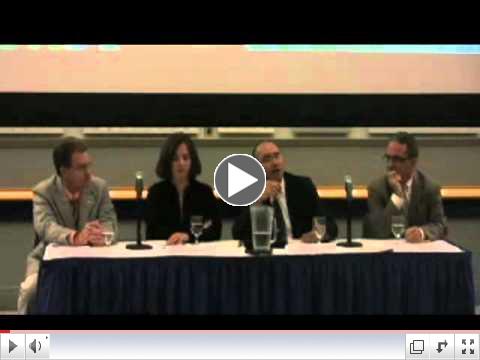|
|
|
Nicholas Institute for Environmental Policy Solutions - November 1, 2011
|
|
|
November 4
Durham, North Carolina
Lecture
Stan Riggs, of East Carolina University and co-author of The Battle for North Carolina's Coast: Evolutionary History, Present Crisis and the Vision for the Future, will present at Duke on the importance of understanding and protecting North Carolina's changing coastline.
November 7
Durham, North Carolina
Lecture
Transportation expert Dan Sperling will speak on how California is adopting a mix of policies, regulations and incentives that together provide a coherent and durable framework for transforming vehicles, fuels and mobility.
November 11
Durham, North Carolina
Fall Seminar Series
Duke University's Brooks Rainey-Pearson and Rob Jackson will present on natural gas fracking science and its policy implications.
For more information on upcoming events, visit the Nicholas Institute's website.
|
|
Get updates as they happen through social media at the Nicholas Institute:
  
|
 | |
Energy, Climate Change and Innovation: An Economist's Perspective
|
|
|
|
|
|
Energy Symposium Registration to End
 Registration for the Nicholas Institute for Environmental Policy Solutions' symposium addressing both current and future energy challenges faced by the southeastern United States ends Nov. 9. The Nov. 16 event will bring recognized thought leaders to the Duke University campus to discuss how to best tackle issues related to population growth, aging infrastructure and renewable energy imperatives in a climate of political, environmental and financial uncertainty. Panel members will share examples of how they have overcome these challenges in their own states and help plot directions for future research and outreach. Register today! Registration for the Nicholas Institute for Environmental Policy Solutions' symposium addressing both current and future energy challenges faced by the southeastern United States ends Nov. 9. The Nov. 16 event will bring recognized thought leaders to the Duke University campus to discuss how to best tackle issues related to population growth, aging infrastructure and renewable energy imperatives in a climate of political, environmental and financial uncertainty. Panel members will share examples of how they have overcome these challenges in their own states and help plot directions for future research and outreach. Register today!
|
|
High-Ranking EPA Official Joins Duke
Longtime U.S. Environmental Protection Agency official Robert Brenner joined Duke University's Nicholas Institute for Environmental Policy Solutions last month.
|
|
Emission, Nitrogen Use in U.S. Agriculture
Agriculture is one of the world's largest sources of greenhouse gas emissions, and the largest source of certain types of anthropogenic nitrogen. Yet, as a source of renewable fuels production and carbon sequestration, agriculture could also be part of the solution to energy security and climate change problems, according to a new report.
|
|
Water Director Search Committee Formed
A four-member committee has been appointed to lead the national search for the next director of water policy at the Nicholas Institute for Environmental Policy Solutions.
|
|
Institute to Purchase Carbon Offsets
Starting in October, Duke community members can lower the emissions they can't reduce or avoid by supporting greenhouse gas emission reduction projects sponsored by Duke. The Nicholas Institute for Environmental Policy Solutions will be among one of the first units to buy offsets.
|
|
Staffer Chosen for Science Advisory Panel
Lydia Olander has been named to a U.S. Environmental Protection Agency Science Advisory panel focused on analyzing the impact of emissions from bioenergy and biogenic stationary sources.
|
|
State Climate Adaptation Strategies
Climate change is expected to pose a number of risks to communities, and states are beginning to develop adaptation plans to reduce climate risks and vulnerabilities. A new Nicholas Institute policy brief shares exactly what direction many are headed.
|
|
Henderschedt Appointed to Fisheries Role
John Henderschedt has been appointed to the Bering Sea Fisheries Advisory Body. Henderschedt, who is the executive director of the Fisheries Leadership and Sustainability Forum, joined the group that includes representatives from the states of Washington and Alaska in October.
|
|
Agricultural Land Management in the U.S.
A number of common best management practices such as switching to no-till, reducing fallow and adjusting management of nitrogen fertilizer can help reduce U.S. agricultural greenhouse gas emissions. A new report and policy brief by the Technical Working Group on Agricultural Greenhouse Gases (T-AGG) assess the mitigation potential of a wide range of these practices and discuss the policy design issues for incentivizing them through the creation of business opportunities or revenue for farmers and ranchers.
|
|
The Nicholas Institute for Environmental Policy Solutions helps decision makers create timely, effective, and economically practical solutions to the world's most critical environmental challenges.
|
|
|
|
|
|
|
|
|
|
Nicholas Institute for Environmental Policy Solutions, Duke University,
P.O. Box 90335, Durham, NC 27708.
|
|
|